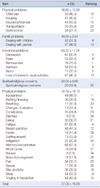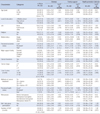Abstract
Purpose
This study was to investigate relationships among distress, family support, and health promotion behavior in breast cancer survivors. The research design was a descriptive study.
Methods
Data were collected through three structured questionnaires: the 'Distress' by Distress management version 1 (National Comprehensive Cancer Network, NCCN), 'Family support' developed by Cobb, and Health promotion behavior developed by Walker, Sechrist and Pender. The subjects were 213 breast cancer survivors from two general hospitals in B metropolitan city from July. 15 to August 15 2013. The data were analyzed using SPSS 18.0, specifically descriptive statistics, t-test, ANOVA, Scheffé test, and Pearson's correlation coefficients were used.
Results
The mean score of distress was 3.91±2.59. 50.2% of the subjects reported a distress score of 4 or more. Among these, the most common problems were emotions. Moderate family support and health promotion behavior. Distress showed negative correlations with Family support (r = - .34, p<.001), and health promotion behavior (r= - .23, p=.002). Family support showed positive correlations with health promotion behavior (r=.43, p<.001).
Conclusion
The health promotion behavior of breast cancer survivors can be improved if family support is improved and distress is decreased. Therefore, a nursing intervention program that leads to improving family support and decreasing the distress of breast cancer survivors is needed to improve health promotion behavior.
Figures and Tables
References
1. National Cancer Information Center. 2011 National cancer statistics. Accessed January 3, 2014. http://www.cancer.go.kr/mbs/cancer/subview.jsp?id=cancer_040401000000.
2. Korean Breast Cancer Society. 2013 breast facts and figures updated. Accessed October, 2013. http://www.kbcs.or.kr.
3. Ward SE, Viergutz G, Tormey D, deMuth J, Paulen A. Patient's reactions to completion of adjuvant breast cancer therapy. Nurs Res. 1992; 41(6):362–366.

5. Alfano CM, Rowland JH. Recovery issues in cancer survivorship; a new challenge for supportive care. Cancer J. 2006; 12:432–443.
6. Suh SR, Kim HJ. The resourcefulness and the health-promoting behaviors of cancer patients. J Korean Acad Adult Nurs. 2000; 12(1):112–121.
7. Pender NJ. Health promotion in nursing practice. third edition. Stamford, Connecticut: Appleton & Lange;1996.
8. Kim HJ, So HS. A study on health promoting behavior in post-mastectomy patients. J Korean Acad Adult Nurs. 2001; 13(1):82–95.
9. Harding M. Health promotion behaviors and psychological distress in cancer survivors. Oncol Nurs Forum. 2012; 39(2):E132–E140.
10. Kim JH. Development of recommendation for distress management toward improvement of quality of life in cancer patients. Seoul: Ministry of Health & Welfare;2009.
11. Kwon EJ, Yi MS. Distress and quality of life in breast cancer survivors in Korea. Asian Oncol Nurs. 2012; 12:289–296.

12. Cottle EM, James JE. Role of the family support person during resuscitation. Nurs Stand. 2008; 29(3):43–47.

13. Park EY, Yi MS. Illness experience of women with breast cancer in Korea: using feminist phenomenology. J Korean Acad Adult Nurs. 2009; 21(5):504–518.
14. Kang HJ. Relationships between perceived family support, self-esteem and depression in breast cancer survivors. [dissertation]. Busan: Kosin Univ.;2013.
15. Min HS, Park SY, Lim JS, Park MO, Won HJ, Kim JI. A study on behaviors for preventing recurrence and quality of life in breast cancer survivors. J Korean Acad Nurs. 2008; 38(2):187–194.

16. Wi ES, Yong JS. Distress, depression, anxiety and spiritual Needs of patients with stomach cancer. Asian Oncol Nurs. 2012; 12:314–322.

17. Park JS, Lee HR. Comparison of distress and body Image according to the stages of cancer survivorship in gynecological cancer patients. Asian Oncol Nurs. 2014; 14(1):15–22.

18. Jeong KS, Park GJ. Relationships among body image, self-esteem and health promotion behavior in mastectomy patients. J Korean Oncol Nurs. 2007; 7:36–45.
19. Shim EJ, Shin YW, Jeon HJ, Hahm BJ. Distress and its correlates in Korean cancer patient: Pilot use of the distress thermometer and the problem list. Psychooncology. 2008; 17:548–555.

20. Cobb S. Social support as a moderator or life stress. Psychosom Med. 1979; 38(5):300–314.
21. Kang HS. Experimental study of the effects of reinforcement education for rehabilitation on hemiplegia patients' self-care activities [dissertation]. Seoul: Yonsei Univ.;1984.
22. Warker SN, Sechris KR, Pende NJ. The health promotion lifestyle profile II (HPLP II). Omaha: Collage of Nursing University of Nebraska Medical center;2002.
23. Park EH, Rue EJ, Choi KS. The effects of the breast self-examination participant education program on breast self-examination compliance and health promoting behaviors in adult women. J Korean Oncol Nurs. 2003; 3(2):133–144.
24. Fallowfield L, Ratcliffe D, Jenkins V, Saul J. Psychiatric morbidity and its recognition by doctors in patients with cancer. Br J Cancer. 2001; 84:1011–1015.

25. Yim JW, Yoon HS, Bak OM, Jo JH, Park SH, Lee SW. A qualitative study of health beliefs and health behaviors among korean breast cancer survivors. Korean J Soc Welf. 2011; 63:155–181.

26. Lee EJ. Family support, self-esteem and health promotion behavior in uterine cancer patients [dissertation]. Seoul: Chung-Ang Univ.;2012.
27. Yun MR, Song MS. A qualitative study on breast cancer survivors' experiences. Perspect Nurs Sci. 2013; 10(1):41–51.
28. Jeong SY. A study on health promoting behavior in patients with breast cancer between self-help and non self-help groups [dissertation]. Seoul: Yonsei Univ.;2009.
29. Lee MS. Depression 119. Seoul: Galimchulpansa;2005.




 PDF
PDF ePub
ePub Citation
Citation Print
Print







 XML Download
XML Download